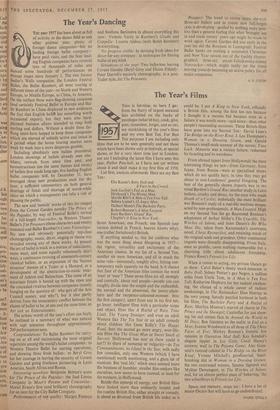The Year's Films
THIS is list-time, so here I go : from the flurry of urgent seasonal lists scribbled on the backs of envelopes (what to buy, cook, give, post, remember, forget, and so on), my stocktaking of the year's films and my own Best Ten. For Best Ten purposes I am including only films that are to be seen generally and not those which have been shown only at festivals, at special shows, or for a very short time just in London; nor am I including the latest film I have seen this year, Father Panchali, as I have not yet written about it and shall make it my first film of 1958.
List first, analysis afterwards. Here are my Best Ten :
Elia Kazan's Baby Doll and
A Face in the Crowd.
Jack Garfein's End as a Man. Hitchcock's The Wrong Man. Martin Ritt's A Man is Ten Feet Tall.
Sidney Lumet's 12 Angry Men.
Delbert Mann's The Bachelor Party.
Robert Bresson's A Man Escaped. Juan Bardem's Grand' Rue. Chaplin's A King in New York.
Seven American; one French; one Spanish (our version dubbed in French, heaven knows why); one (rather fortuitously) British.
If anything needed to, this list confirms what was the main thing about filmgoing in 1957— the vigour, versatility and excitement of the American cinema. In my list of a Second Ten, another six were American, and all in much the same vein—immensely, toughly alive, hitting con- temporary nails squarely on the head. Is it chance that four of the American titles contain the word 'man' or 'men'? These seven films are all, strongly and centrally, about real people—people you can roughly divide into the simple and the outlandish, the normal and the abnormal, the penny-plain- hero and the twopence-coloured-monster. Into the first category, apart from any in my first ten, go lesser, intelligent films with a particular scope and object, films like A Hatful of Rain, Time Limit, The Young Stranger; and even an adult Western like The Tin Star or an adult comedy about children like Gene Kelly's The Happy Road. Into the second go more angry, over-life- size films like The Great Man or Sweet Smell of Success. Hollywood has sent us (how could it not?) its share of nonsense or vulgarity—its Ten Commandments, its Island in the Sun; with sadly few comedies, only one Western (which I have mentioned) worth mentioning, and a glum lot of musicals. But 'real life,' which once seemed more the business of humbler, smaller film-makers like ourselves, now seems to have roosted, at least for the moment, in Hollywood.
Beside this upsurge of energy, our British films have looked more than ordinarily insipid, and the routine British film, either straight or comedy, is about as divorced from British life today as it could be. I put A King in New York. officially a British film, among the first ten not because I thought it a success but because even as a failure it was worth more—said more—than other people's resounding successes. Three British films have gone into my Second Ten : David Lean's The Bridge on the River Kwai, J. Lee Thompson's Woman in a Dressing Gown, and Gerald Thomas's small-scale screwer of the nerves, Time Lock. Manuela was a rococo failure, redeemed by its acting and its weirdness.
From abroad (apart from Hollywood) the most interesting things we saw—from Germany, from Japan, from Russia—were at specialised shows which do not qualify here; in time they may get about to non-Londoners' general filmgoing. The best of the generally shown imports was to my mind Bardem's Grand' Rue, another study in Latin tedium, cruelty and decay, by the man who made Death of a Cyclist; technically the most brilliant was Bresson's study of a real-life wartime escape, acted by non-professionals, A Man Escaped. High on my Second Ten list go Raymond Rouleau's adaptation of Arthur Miller's The Crucible, The Witches of Salem; and Jules Dassin's He Who Must Die, taken from Kazantsakis's enormous novel, Christ Recrucified, and retaining much of the original scale and grandeur. Other continental imports were dismally disappointing. From Italy, once so prolific, came nothing memorable but a charming trifle about adolescent friendship, Franco Rossi's Friends for Life.
When it comes to acting, my private Oscars go to these : Carol Baker's sleazy mock-innocent in Baby Doll; Sidney Poitier's gay Negro, a million miles from Uncle Tom, in A Man is Ten Feet Tall; Katharine Hepburn for her radiant awaken- ing, the climax of a whole career of radiant awakenings, in The Rainmaker; Don Murray as the very young, fiercely puzzled husband in both his films, The Bachelor Party and A Hatful of Rain; Marilyn Monroe's marvel of charm in The Prince and the Showgirl; Cantinflas for just show- ing his sad simian face in Around the World in 80 Days; Ben Gazzara as the sadist in End as a Man; Joanne Woodward as all three of The Three Faces of Eve; Mickey Rooney's frenetic few minutes in Operation Mad Ball; Kay Kendall's elegant tippler in Les Girls; Carol Haney 's scrawny waif in The Pajama Game; Alec Guin- ness's ramrod colonel in The Bridge on the River Kwai; Yvonne Mitchell's goodhearted, heart- breaking slut in Woman in a Dressing Grown; the two contrasted women, Simone Signoret and Mylene Demongeot, in The Witches of Salem: and, for an almost perfect piece of 'behaving,' the two schoolboys in Friends for Life.
Space, not memory, stops me : I have a lot of minor Oscars that will have to go undistributed.
ISABEL QUIGLY


























 Previous page
Previous page